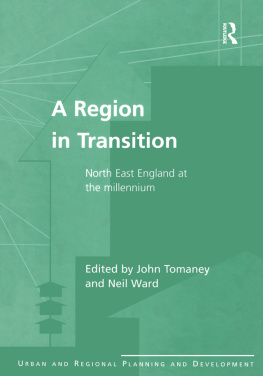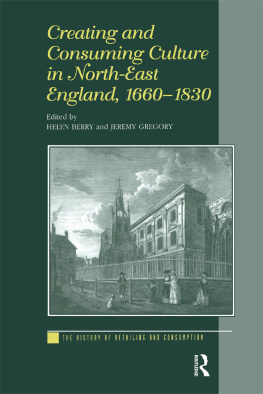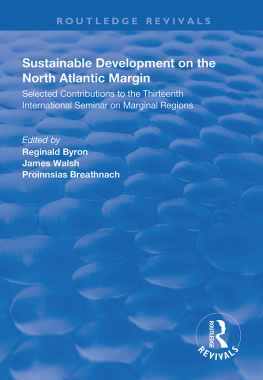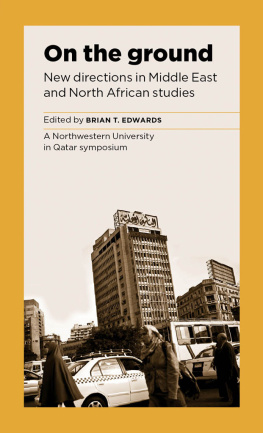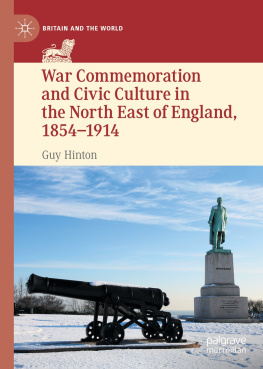A REGION IN TRANSITION
To the memory of R.M. 'Meff' Hughes, 1910-1999, Durham miner
A Region in Transition
North East England at the millennium
Edited by
John Tomaney
Centre for Urban and Regional Development Studies
University of Newcastle, Newcastle upon Tyne
United Kingdom
Neil Ward
Department of Geography, University of Newcastle
Newcastle upon Tyne, United Kingdom
First published 2001 by Ashgate Publishing
Published 2017 by Routledge
2 Park Square, Milton Park, Abingdon, Oxon OX14 4RN
711 Third Avenue, New York, NY 10017, USA
Routledge is an imprint of the Taylor & Francis Group, an informa business
Copyright John Tomaney and Neil Ward 2001
All rights reserved. No part of this book may be reprinted or reproduced or utilised in any form or by any electronic, mechanical, or other means, now known or hereafter invented, including photocopying and recording, or in any information storage or retrieval system, without permission in writing from the publishers.
Notice:
Product or corporate names may be trademarks or registered trademarks, and are used only for identification and explanation without intent to infringe.
British Library Cataloguing in Publication Data
A region in transition: North East England at the
millennium.-(Urban and regional planning and development)
1. Regional planning-England, North East 2. England, North
East-Economic policy 3. England, North East-Politics and
government
I. Tomaney, John, 1963-II. Ward, Neil
338.9428
Library of Congress Control Number: 00-134811
ISBN 13: 978-0-7546-1022-9 (hbk)
Susan Baines Centre for Urban and Regional Development Studies, University of Newcastle
Paul Benneworth Centre for Urban and Regional Development Studies, University of Newcastle
Priscilla Boniface Formerly University of Northumbria
David Charles Centre for Urban and Regional Development Studies, University of Newcastle
James Cornford Centre for Urban and Regional Development Studies, University of Newcastle
Peter Fowler Formerly University of Newcastle
Robert Hollands Department of Social Policy, University of Newcastle
Chris Lanigan District Audit/Audit Commission, Gateshead, formerly Department of Politics, University of Newcastle
Philip Lowe Centre for Rural Economy, Department of Agricultural Economics & Food Marketing, University of Newcastle
Suzanne Moffatt Department of Epidemiology and Public Health, University of Newcastle
Peter Phillimore Department of Social Policy, University of Newcastle
Andy Pike Centre for Urban and Regional Development Studies, University of Newcastle
Tanja Pless-Mulloli Department of Epidemiology and Public Health, University of Newcastle
Mike Robinson Centre for Travel and Tourism, University of Northumbria
John Tomaney Centre for Urban and Regional Development Studies, University of Newcastle
Neil Ward Department of Geography, University of Newcastle
Jane Wheelock Department of Social Policy, University of Newcastle
Rachel Woodward Centre for Rural Economy, Department of Agricultural Economics & Food Marketing, University of Newcastle
We would like to thank the University of Newcastle's Institute for Urban and Rural Research for providing financial support for the research seminar at which the chapters in this volume were first presented and to all those who participated in the event. We would also like to express our gratitude to Sue Robson at the Centre for Urban and Regional Development Studies for her time and patience in assisting us with the editing and page-setting of the book.
John Tomaney and Neil Ward
JOHN TOMANEY AND NEIL WARD
Introduction
This book is about is the North East of England. The production of the book is the result of an experiment conducted within a context of rapid economic, social, cultural and political change. It has its intellectual origins in its editors' interest in debates about the 're-emergence' of the region as basic unit of economic analysis and as the sphere most suited to the to the interaction of political, social and economic processes in an era of 'globalisation'. It is also borne out of an interest in the changing pattern of territorial relationships in the United Kingdom and the implications of this for the English regions in general and the North East of England in particular. While great claims are being made about the importance of regions, and new institutions are being created purportedly to serve their interests, there is a lamentably low level of debate within the English regions about the questions that arise from these processes. Lacking civic arenas in which the key issues can be raised and, more importantly, debated, the English regions are often poorly placed to grasp the scale of the challenges that confront them in this new era. However, questions are asked, information is gathered and, occasionally, solutions are proposed to regional problems among the universities. As a recent report on higher education noted, UK universities have had only very limited engagement with their wider regions (Dearing Committee, 1997, para 12.7). Although English universities, especially in regions like the North East, are frequently undertaking empirical research within their regions sometimes for regional agencies there appear to be few attempts to bring this research together and to assess their combined contribution to understanding development.
The papers in this volume, therefore, result from an effort to redress this situation. Their origins lie in a seminar held at Newcastle University in 1998, designed to assess (and demonstrate) the breadth of research with a regional focus. The meeting involved researchers from six of the University's nine faculties, although the focus was strongly a social science one. One aim of the meeting was to bring together diverse researchers whose work was focused on the North East region or some geographical component of it. A second hope was that common themes and insights would emerge from the discussions. A third aim was to make at least a modest contribution to the University's objective of strengthening and focussing its engagement with wider interests in the North East beyond the ivory towers of academia.
The remainder of this introductory chapter provides an introduction to both the claims about the importance of 'the region' and regionalism, especially the implications of this in an English context, and to the chapters arising from the seminar.
Locating the region
There is a heightened interest in 'the region' as a locus of political, economic and cultural activity. A large amount of literature suggests that, for a variety of reasons, 'the regional question' has gained a new prescience. In the UK, an obvious source of interest derives from recent constitutional changes that have led to the creation of devolved political institutions in Scotland, Wales, Northern Ireland. But for many scholars regionalisation is a 'global' or, at least, 'Europe-wide' process. From this latter perspective, recent events in the UK simply reflect similar events occurring elsewhere in the world. Regionalism, therefore, is seen as one aspect of a broad set of economic, social, cultural and political changes that are transforming territorial relationships. In particular, according to this position, a defining characteristic of the contemporary period is the declining capacities of the nation-state. It is claimed that the power and authority of the nation-state has been eroded from a number of directions. First, it has been challenged from above by 'globalisation', including the globalisation of economic activity and the growth of supra-national political forms of authority such as the EU, which regulate that activity. But the state is also under challenge laterally by the further advance of market relationships. The resurgence of the private sector and the alleged rise of the 'knowledge economy' are linked to, and encourage, economic globalisation. Taken together 'globalisation' and 'marketisation' of social and economic relationships erode the capacities of the state in economic management, in social solidarity, in culture and identity formation, as well as its institutional configuration (e.g. Giddens, 1998; Castells, 1996; Held, et al., 1999).

